Health
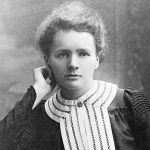 Marie Sklodowska was born in an era when women seldom got a very long education, if they got one at all. Born on November 7, 1867 in Warsaw (modern-day Poland). Sklodowska was the youngest of five children, following siblings Zosia, Józef, Bronya and Hela. Their parents were both teachers. Her father, Wladyslaw, was a math and physics instructor. When she was only 10, Sklodowska lost her mother, Bronislawa, to tuberculosis. Sklodowska, being a woman, probably should have grown up to be a wide and mother, dependent on her husband for everything…not that that is a horrible thing, because it isn’t, but it was not all she wanted. She had a good mind for Physics and Chemistry…both subjects were almost unheard of for women in those days.
Marie Sklodowska was born in an era when women seldom got a very long education, if they got one at all. Born on November 7, 1867 in Warsaw (modern-day Poland). Sklodowska was the youngest of five children, following siblings Zosia, Józef, Bronya and Hela. Their parents were both teachers. Her father, Wladyslaw, was a math and physics instructor. When she was only 10, Sklodowska lost her mother, Bronislawa, to tuberculosis. Sklodowska, being a woman, probably should have grown up to be a wide and mother, dependent on her husband for everything…not that that is a horrible thing, because it isn’t, but it was not all she wanted. She had a good mind for Physics and Chemistry…both subjects were almost unheard of for women in those days.
As a child, Sklodowska took after her father. She was bright and curious, and she excelled at school. Still, despite being a top student in her secondary school, she could not attend the men’s-only University of Warsaw. She instead continued her education in Warsaw’s “floating university,” a set of underground, informal classes held in secret. Both Marie and her sister, Bronya dreamed of going abroad to earn an official degree, but they lacked the financial resources to pay for more schooling. Sklodowska would not give up her dream. She worked out a deal with her sister, “She would work to support Bronya while she was in school, and Bronya would return the favor after she completed her studies.”
Sklodowska worked as a tutor and a governess for the next five years. She didn’t want to get behind, so she used her spare time to study…reading about physics, chemistry and math. Then in 1891, Sklodowska finally made her way to Paris and enrolled at the Sorbonne. She threw herself into her studies, but this dedication had a personal cost: with little money, Sklodowska survived on buttered bread and tea. Sometimes, her health suffered because of her poor diet. Nevertheless, Sklodowska completed her master’s degree in physics in 1893 and earned another degree in mathematics the following year.
You might be wondering exactly who Marie Sklodowska was, and why she was important. It might help to know that on July 26, 1895, Marie got married to French physicist, Pierre Curie. They were introduced by a colleague of Marie’s after she graduated from Sorbonne University. Marie had received a commission to perform a study on different types of steel and their magnetic properties and needed a lab for her work. As most people already know, she did her work at a great cost to her own health, but what most people probably don’t know, is that the radiation levels Curie was exposed to were so powerful that her notebooks must now be kept in lead-lined boxes, and it’s not just Curie’s manuscripts that are too dangerous to touch, either. If you visit the Pierre and Marie Curie collection at the Bibliotheque Nationale in France, many of her personal possessions…from her furniture to her cookbooks…require protective clothing to be safely handled. You’ll also have to sign a liability waiver, just in case.
In those days, things like radiation and it’s dangers were not known. Marie Curie was basically walking around with bottles of polonium and radium, both highly radioactive compounds, in her pockets all the time. She even kept capsules full of the dangerous chemicals on her shelf. “One of our joys was to go into our workroom at night; we then perceived on all sides the feebly luminous silhouettes of the bottles of capsules containing our products,” Marie, the Nobel Prize-winning scientist wrote in her autobiography. “It was really a lovely sight and one always new to us. The glowing tubes looked like faint, fairy lights.” In case you didn’t know, Marie Curie discovered radioactivity. Also, along with her husband, Pierre, they discovered the radioactive elements, Polonium and Radium, while working with the mineral, Pitchblende…a form of the mineral Uraninite occurring in 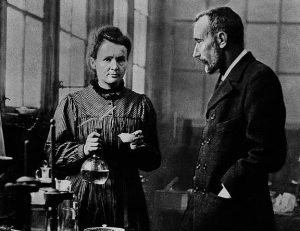 brown or black masses and containing radium. She also championed the development of X-rays, following her husband’s death in a street accident in Paris on 19 April 1906.
brown or black masses and containing radium. She also championed the development of X-rays, following her husband’s death in a street accident in Paris on 19 April 1906.
The fact that the notebook and related paraphernalia are still radioactive a century later is not as well known. The most common isotope of radium, the deadly chemical Curie carried in her pockets, has a half-life of 1,601 years. That said, people will not be able to go digging through the Curie’s library any time in this century, either. It is also known now, but wasn’t then, that the chemicals would end Curie’s life at a fairly early age. Curie died on July 4, 1934, of aplastic anemia, believed to be caused by prolonged exposure to radiation. She was 58 years old.
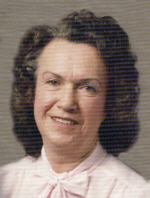
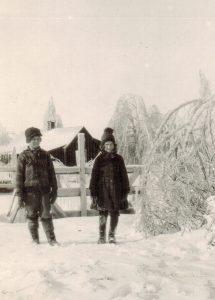 My Aunt Ruth Wolfe was the youngest of the four children of my grandparents, Allen and Anna Spencer. She was born on November 9, 1925 in Duluth, Minnesota. Strange to think that 31 years later, she would get a niece…me, who would be so much like her…in some ways that is. My Aunt Ruth was a very talented woman. She could play any instrument that was set before her, she could paint and do crafts, she loved horses and even raced them, and of course, she was an animal lover…all animals.
My Aunt Ruth Wolfe was the youngest of the four children of my grandparents, Allen and Anna Spencer. She was born on November 9, 1925 in Duluth, Minnesota. Strange to think that 31 years later, she would get a niece…me, who would be so much like her…in some ways that is. My Aunt Ruth was a very talented woman. She could play any instrument that was set before her, she could paint and do crafts, she loved horses and even raced them, and of course, she was an animal lover…all animals.
Aunt Ruth was never really one to want to settle in one place for very long…until she and Uncle Jim moved to the Spokane area, that is. Once they bought their mountain top outside of Newport, Washington, she knew she was home. The family built three cabins on the mountain top, one for Aunt Ruth and Uncle Jim; one for their daughter Shirley Cameron and her husband Shorty; and one for their son, Terry Wolfe. The beauty of the mountain lulled them into a quiet, peaceful life, far away from the hustle and bustle of the California area they had left behind after losing their son, Larry Wolfe to an accidental explosion. Nothing would bring him back, of course, but the peace of the mountain top helped to heal their wounded hearts.
Aunt Ruth and Uncle Jim, while very much at home on their mountain top, never lost their love of the open road, and often took trips to several location, including Casper, Wyoming to visit my family, her brother, Allen Spencer; sister-in-law, Collene; and daughters, Cheryl Masterson, Caryn Schulenberg, Caryl Reed, Alena 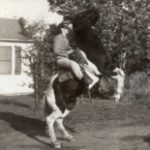
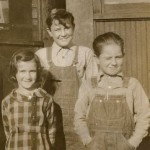 Stevens, and Allyn Hadlock. We loved those visits. Aunt Ruth and Uncle Jim were always lots of fun, and having them in town again was a great treat. They had lived in the Casper area years before, and we were all very sad to see them move away. Those wonderful visits were cut short when Aunt Ruth became ill, and she passed away on May 11, 1992 of Cancer. Today would have been Aunt Ruth’s 94th birthday. Happy birthday in Heaven Aunt Ruth, I know you’re having a great celebration with all the loved ones who have now joined you there. We love and miss you very much.
Stevens, and Allyn Hadlock. We loved those visits. Aunt Ruth and Uncle Jim were always lots of fun, and having them in town again was a great treat. They had lived in the Casper area years before, and we were all very sad to see them move away. Those wonderful visits were cut short when Aunt Ruth became ill, and she passed away on May 11, 1992 of Cancer. Today would have been Aunt Ruth’s 94th birthday. Happy birthday in Heaven Aunt Ruth, I know you’re having a great celebration with all the loved ones who have now joined you there. We love and miss you very much.
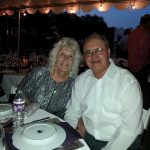 Birthdays are supposed to be happy events, and most are, but the birthdays that come after someone has passed away can be some of the hardest days we will ever spend. Losing a loved one leaves the family with nothing but empty space and memories. The place our loved one once filled with their presence, is now filled only with memories of someone who was, and still is, so important to us. Each first, as it arrives makes the emptiness even more pronounced. The first holiday, birthday, family dinner, or even just the mundane tasks they always helped with, are among the worst days of our new reality, but I think it is the first of those events that will always be viewed as the worst.
Birthdays are supposed to be happy events, and most are, but the birthdays that come after someone has passed away can be some of the hardest days we will ever spend. Losing a loved one leaves the family with nothing but empty space and memories. The place our loved one once filled with their presence, is now filled only with memories of someone who was, and still is, so important to us. Each first, as it arrives makes the emptiness even more pronounced. The first holiday, birthday, family dinner, or even just the mundane tasks they always helped with, are among the worst days of our new reality, but I think it is the first of those events that will always be viewed as the worst.
On October 16, 2019, our uncle, Eddie Hein had a heart attack while working in his 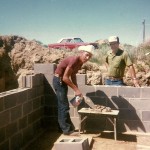 yard. Friends and neighbors, as will as his wife, Pearl and their grandson, Dalton, all tried to help, but it was too late. Eddie was gone, but his memory will be with his many friends and family members forever. Eddie was a sweet man with a heart of gold, who was always willing to help those in need. The people of Forsyth, Montana knew Eddie well. He was a friend to all. He would wave as he drove by, and help when it was needed. Eddie was known around town as someone who could always be counted on, no matter what the need. He was there to give a smile, a hug, a wave, or a hand. Someone said that Eddie was one of God’s great ones, and I agree.
yard. Friends and neighbors, as will as his wife, Pearl and their grandson, Dalton, all tried to help, but it was too late. Eddie was gone, but his memory will be with his many friends and family members forever. Eddie was a sweet man with a heart of gold, who was always willing to help those in need. The people of Forsyth, Montana knew Eddie well. He was a friend to all. He would wave as he drove by, and help when it was needed. Eddie was known around town as someone who could always be counted on, no matter what the need. He was there to give a smile, a hug, a wave, or a hand. Someone said that Eddie was one of God’s great ones, and I agree.
Eddie loved vintage cars, and had his own 55 Chevy that he thoroughly enjoyed. It wasn’t just the cars either, 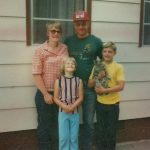 because he loved old tractors too. Eddie loved living next to the Yellowstone River. It was almost like living in the country, and it gave them enough room to have their garden. Eddie could fix just about anything. He loved tinkering around in his shop. If you needed a part for something, there was a good chance that Eddie had it or could make it. He was a great carpenter, and could help build just about anything. Eddie was a bit of a Jock of all trades, and the people of Forsyth counted on him for many things. That is a big part of what makes his passing so sad for everyone, and the only consolation is that since Eddie was a Christian man, we know that we will see him again soon. Happy first Heavenly Birthday Eddie. We love and miss you very much.
because he loved old tractors too. Eddie loved living next to the Yellowstone River. It was almost like living in the country, and it gave them enough room to have their garden. Eddie could fix just about anything. He loved tinkering around in his shop. If you needed a part for something, there was a good chance that Eddie had it or could make it. He was a great carpenter, and could help build just about anything. Eddie was a bit of a Jock of all trades, and the people of Forsyth counted on him for many things. That is a big part of what makes his passing so sad for everyone, and the only consolation is that since Eddie was a Christian man, we know that we will see him again soon. Happy first Heavenly Birthday Eddie. We love and miss you very much.
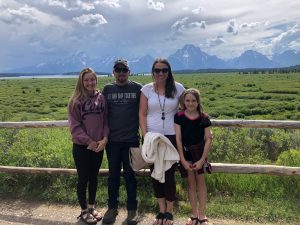
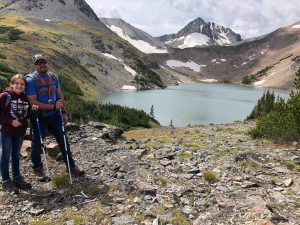 When a person travels for business, they find that they really understand the importance of home. My niece, Susan Griffith is one of the many people who travel as part of their job. Susan works for Blue Cross Blue Shield of Wyoming, as a Client Development Executive, basically she is a health insurance agent. She travels to Cheyenne about twice a year around the time people have to update their insurance…open enrollment. She has to go for training. She has to travel around the Bighorn Basin for getting different companies signed up for Blue Cross. Because Susan has to travel for work, she knows how it feels to have to spend that time away from family. Everyone I have talked to about traveling for work has told me that they had little tricks to make a hotel room feel more like home. I don’t know if Susan has a way that helps her or not, but I do know that her home and her family are the most important things in her life. Nevertheless, travel time aside, Susan loves her job!!
When a person travels for business, they find that they really understand the importance of home. My niece, Susan Griffith is one of the many people who travel as part of their job. Susan works for Blue Cross Blue Shield of Wyoming, as a Client Development Executive, basically she is a health insurance agent. She travels to Cheyenne about twice a year around the time people have to update their insurance…open enrollment. She has to go for training. She has to travel around the Bighorn Basin for getting different companies signed up for Blue Cross. Because Susan has to travel for work, she knows how it feels to have to spend that time away from family. Everyone I have talked to about traveling for work has told me that they had little tricks to make a hotel room feel more like home. I don’t know if Susan has a way that helps her or not, but I do know that her home and her family are the most important things in her life. Nevertheless, travel time aside, Susan loves her job!!
Susan and her husband, Josh Griffith love to go camping in the mountains. They, like other members of her 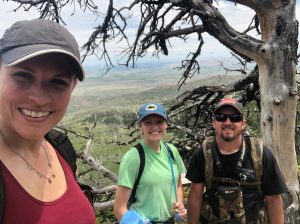
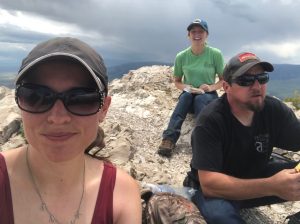 family, would live in the mountains, if it weren’t for jobs or school for their girls, Jala Satterwhite and Kaytlyn Griffith. They go camping every chance they get. They love to hike, and this year, they hiked Heart Mountain, which is relatively near their home in Powell, Wyoming. Heart Mountain gained world fame in World War II, when it was used as a concentration camp to hold Japanese-American citizen, after the attack on Pearl Harbor. Many people weren’t sure where Japanese-American loyalties lay, so the didn’t take a chance, and moved the people to camps. It was a sad, but understandable time. Susan’s family also hiked to Copper Lake in the Beartooth Mountains, but they don’t think they will try that one again, because in Susan’s own words, “It was crazy hard!!” This past year, they did something a little different too. San Diego can’t exactly be considered camping in the mountains. Nevertheless, they had a great time. They went to Sea World, and all the other great attractions of the area, including the ocean.
family, would live in the mountains, if it weren’t for jobs or school for their girls, Jala Satterwhite and Kaytlyn Griffith. They go camping every chance they get. They love to hike, and this year, they hiked Heart Mountain, which is relatively near their home in Powell, Wyoming. Heart Mountain gained world fame in World War II, when it was used as a concentration camp to hold Japanese-American citizen, after the attack on Pearl Harbor. Many people weren’t sure where Japanese-American loyalties lay, so the didn’t take a chance, and moved the people to camps. It was a sad, but understandable time. Susan’s family also hiked to Copper Lake in the Beartooth Mountains, but they don’t think they will try that one again, because in Susan’s own words, “It was crazy hard!!” This past year, they did something a little different too. San Diego can’t exactly be considered camping in the mountains. Nevertheless, they had a great time. They went to Sea World, and all the other great attractions of the area, including the ocean.
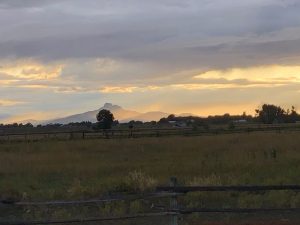
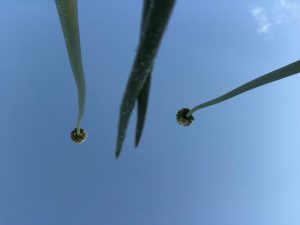 With all her traveling nearby, and far away, Susan somehow still finds time to grow a garden. This year, she had a good crop of onions and asparagus…just to name a couple. When she isn’t traveling or camping/hiking, Susan likes to be home. She enjoys nesting, and being with her family. In all, Susan lives a well rounded life, and finds herself very happy in it. Today is Susan’s birthday. Happy birthday Susan!! Have a great day!! We love you!!
With all her traveling nearby, and far away, Susan somehow still finds time to grow a garden. This year, she had a good crop of onions and asparagus…just to name a couple. When she isn’t traveling or camping/hiking, Susan likes to be home. She enjoys nesting, and being with her family. In all, Susan lives a well rounded life, and finds herself very happy in it. Today is Susan’s birthday. Happy birthday Susan!! Have a great day!! We love you!!
 On the first trip I made to Forsyth, Montana with my husband, Bob Schulenberg’s family, I was introduced to his family there…among them, Eddie Hein, Bob’s uncle…his dad’s half-brother. That first trip was followed by yearly trips for many years to come. We loved going up for visits, and we were always made to feel welcome. Eddie was a quiet man…soft spoken, but with a big heart. You always felt accepted by him. Eddie had a great big smile, and a laugh that lit up his face, and he liked to laugh. I will miss his smile, and his big hearted kindness. There was never the formality of calling Eddie and Pearl, uncle and aunt, because they weren’t that much older than many of their nieces and nephews were. Even though we didn’t see them as much lately as we used too, it was always good knowing that he was there. Now, suddenly, Eddie is gone. He passed away yesterday, even though it seemed that his health was improving after his stroke of a few years ago. We will all miss him very much.
On the first trip I made to Forsyth, Montana with my husband, Bob Schulenberg’s family, I was introduced to his family there…among them, Eddie Hein, Bob’s uncle…his dad’s half-brother. That first trip was followed by yearly trips for many years to come. We loved going up for visits, and we were always made to feel welcome. Eddie was a quiet man…soft spoken, but with a big heart. You always felt accepted by him. Eddie had a great big smile, and a laugh that lit up his face, and he liked to laugh. I will miss his smile, and his big hearted kindness. There was never the formality of calling Eddie and Pearl, uncle and aunt, because they weren’t that much older than many of their nieces and nephews were. Even though we didn’t see them as much lately as we used too, it was always good knowing that he was there. Now, suddenly, Eddie is gone. He passed away yesterday, even though it seemed that his health was improving after his stroke of a few years ago. We will all miss him very much.
Bob and I went to Forsyth, two years ago, after his stroke, and I am so glad that we made that trip. It is a trip I will cherish now. Eddie and Pearl, his wife, were both is good spirits, and the trip was so much fun. His mobility was good, even after the stroke, and he seemed just like his old self. I was glad. Pearl just beamed. She was so happy to have him beside her…something I understand after my own husband’s heart attack. You learn to set aside things that don’t matter so much, and live for the day you are in. That’s what Eddie and Pearl were doing too. There were times that Pearl wanted to declutter…we all need to do that from time to time, but  Eddie wanted her to let that go, and just be together. I think I understand where he was coming from, as I’m sure Pearl does too. Stuff can be cleaned out anytime, but time cannot be relived. Memories are always with us, but we have to live them to have them first, to make the memories. Eddie and Pearl lived them.
Eddie wanted her to let that go, and just be together. I think I understand where he was coming from, as I’m sure Pearl does too. Stuff can be cleaned out anytime, but time cannot be relived. Memories are always with us, but we have to live them to have them first, to make the memories. Eddie and Pearl lived them.
They were married on July 15, 1967, and their marriage was blessed with two children, Larry on May 17, 1969; and Kim on June 27, 1971. Life was good. Eddie worked for many years at Peabody Coal in Colstrip, Montana; while Pearl worked at the IGA in Forsyth, until they both retired. This past July they celebrated their 52 wedding anniversary. Eddie and Pearl had a house in Forsyth, Montana, along the Yellowstone River. They raised vegetables, and Pearl canned they every year. Eddie had a garage where he could tinker, and he loved caring for the garden. He was also a capable carpenter. He turned their mobile home into a beautiful house, with a fireplace made from area stone. It was beautiful. Eddie was always willing to help other people with their own projects, including when his brother, Walt Schulenberg, my father-in-law was building his house outside of Casper, Wyoming. As the years passed, Eddie and Pearl became grandparents. They loved their time with those kids, and I’m sure the kids loved the time with them.

It’s hard to believe that Eddie is gone now. There will always be an empty place that belonged to him. I am thankful for the memories of our trips to Forsyth, and the wonderful visits to Eddie and Pearl’s house. I can picture it now, sitting around their table, drinking coffee, and listening to the stories of our lives. It didn’t matter what we talked about…their lives or our lives, we were reconnecting, and that always felt good. I will really miss those times. It saddens me to have the aunts and uncles leaving us. They contribute so much to our lives, and that rich heritage is slipping away with each one who goes home to Heaven. Still, Eddie, like so many others who have gone on before us, is in our future now, not our past. We will see him again. Rest in peace Eddie. We love and miss you already.
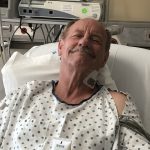
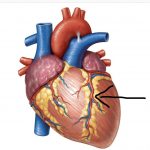 One year ago today, my husband, Bob Schulenberg had a heart attack. It was one of the worst days of my life, and one of the best days of my life. I will never forget the scene after a man knocked on my car window in the parking lot at Walmart, asking me if “I know this man?” I immediately jumped out of my car and walked around the back of it, to be greeted with the worst scene of my life. Lying there on the pavement, bleeding from his head, was my precious husband. His eyes were open, but they were blank, and his skin was turning purple. After thinking I was going to lose him right there, I shook my head and said, “No!!” Getting down on the ground, I said, “Come on Bob…come on!!” Willing him to fight.
One year ago today, my husband, Bob Schulenberg had a heart attack. It was one of the worst days of my life, and one of the best days of my life. I will never forget the scene after a man knocked on my car window in the parking lot at Walmart, asking me if “I know this man?” I immediately jumped out of my car and walked around the back of it, to be greeted with the worst scene of my life. Lying there on the pavement, bleeding from his head, was my precious husband. His eyes were open, but they were blank, and his skin was turning purple. After thinking I was going to lose him right there, I shook my head and said, “No!!” Getting down on the ground, I said, “Come on Bob…come on!!” Willing him to fight.
It was then that a Wyoming Medical Center, Progressive Care Unit, cardiac care nurse showed up. Ginger Sims took charge. She started checking vitals, and immediately saw that he wasn’t breathing. She turned him over and began CPR. It had been maybe a minute since his heart attack. Suddenly, I could see that there was a swarm of people there to help Bob…each one orchestrated by God to be there at that very moment, some of them who never shopped at Walmart. Sean Pesicka-Taggart saw Bob fall, and came to him immediately. It was Sean who first alerted Ginger to the problem, when she saw him trying to help Bob. After beginning CPR, and tiring of doing compressions, Laura Lance, Sean’s girlfriend, and a transport worker at WMC, told Ginger that she knew CPR and could spell her. Ginger wasn’t sure, but she needed a break. Laura took over, and Ginger could see that she did know CPR. Sean had called 911, and got help coming. Then, as she was leaving the Walmart parking lot, another nurse, Valya Boycheva, who was also a friend of Ginger’s saw someone doing CPR, and turned her car around to come back and took turns doing CPR. Ginger heard me talking to Bob, and said if I knew him, I could do rescue breathing for him. I did, with instruction. It’s amazing how quickly your mind checks out when you are in this kind of situation. I had no idea what to do, even though I should have. The next thing I knew, the fire department was there. They hooked Bob up to the Lucas Machine, which does compression automatically. Bob was loaded into the ambulance, and I went along with him. Our fireman friend, Jerod Levin brought our car to the hospital for me.
As people were leaving Walmart, a number of them, saw all this and began praying…Chelsea and Zack Kessler; Chelsea called her parents and my friends, Page and Donna LePage; a member of my church, Lori Desanti; my boss, Jim Stengel; who called Donna LePage to pray, at which point she knew who she had already been praying for. The Cath Lab at WMC was staffed by people who knew Bob…he worked on their cars…Sam Cann and John Cooke, working with Dr Pickrell and Dr Hiser, who put a stent in Bob’s heart. From heart attack, to stent and functioning heart, took just 2 hours. This was a miracle of God, and we were very blessed with more time together.
That was one year ago today. This day, October 14, 2019, Bob’s 1st Heart Re-Birthday, is a very different kind of day. This day we will go to workout at the Nerd Center at WMC, where Bob has been in maintenance since his cardiac rehab was finished. We did a lot of walking before that horrible day last year, and they say that is why Bob’s heart has done so well. I agree, but God healed his heart. There in no other explanation for me.
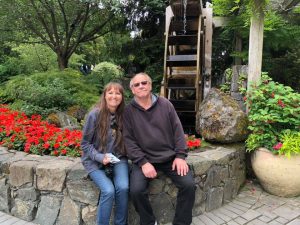
One might expect it to take a long time for Bob to heal, but it didn’t. He is completely back to normal now, and our lives continue on as usual…except that we truly know what we have. There is nothing that will make you appreciate your spouse more than almost losing them. It makes you realize just how blessed you are. We want to thank each and every one of the people involved in this miracle. With God’s help and your willing hearts, you all beat the Widowmaker, and we are forever grateful. Today is Bob’s 1st Heart Re-Birthday. It is an amazing day…the day that the Lord has made. We will rejoice today and be very glad in it. Happy 1st Heart Re-Birthday Bob!! We all love you!!
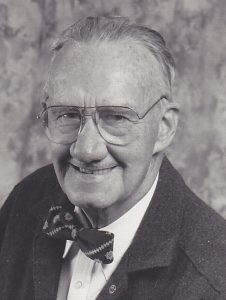 I am amazed at the number of inventions that have changed our world, but when they were invented, they were not what the inventor was trying to invent. Basically, while trying to make one thing, or repair something, the inventor stumbled on something else, and made an important discovery. Wilson Greatbatch was an inventor who had been quite successful, having 150 patents to his credit at the time of his accidental invention. Overall, in his lifetime, he was credited with an astonishing total of 325 patents for his many great brainstorms. Patents aside, Greatbatch will be best remembered for the invention and development of the first implantable pacemaker, a device which has improved, saved, and extended countless lives since its first use in 1960. Worldwide, approximately three million people currently benefit from Greatbatch’s discovery, with an additional 600,000 being implanted every year. It was not what he had be trying to make, however.
I am amazed at the number of inventions that have changed our world, but when they were invented, they were not what the inventor was trying to invent. Basically, while trying to make one thing, or repair something, the inventor stumbled on something else, and made an important discovery. Wilson Greatbatch was an inventor who had been quite successful, having 150 patents to his credit at the time of his accidental invention. Overall, in his lifetime, he was credited with an astonishing total of 325 patents for his many great brainstorms. Patents aside, Greatbatch will be best remembered for the invention and development of the first implantable pacemaker, a device which has improved, saved, and extended countless lives since its first use in 1960. Worldwide, approximately three million people currently benefit from Greatbatch’s discovery, with an additional 600,000 being implanted every year. It was not what he had be trying to make, however.
Wilson Greatbatch was born the son of British immigrants, Warren and Charlotte Greatbatch, in Buffalo, New York, in 1919. He attended school at West Seneca, New York. He had many interests, among which were the sea scouts and amateur radio. Greatbatch was just 16 years old when he received his amateur radio license. During World War II, Greatbatch served in the US Navy as an aviation chief radioman. He took advantage of the 1944 GI Bill to attend Cornell University, where he studied electrical engineering. He graduated in 1950 and began a teaching career at the University of Buffalo in 1952.
It was in 1956, while working at Buffalo, that he made his most important discovery. While it was his most important discovery, it was also the result of an error. Greatbatch had been working on a heart-rhythm recorder, but he mistakenly added an incorrect electronic component. The resulting device produced electrical pulses, instead of simply recording the rhythm. Recalling the event later, he said “I stared at the thing in 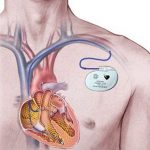 disbelief.” Greatbatch realized immediately that he had found a way to electrically simulate and stimulate a heartbeat. It was to become the most important invention of his life, and one that millions of people would be eternally grateful to him for “stumbling upon.”
disbelief.” Greatbatch realized immediately that he had found a way to electrically simulate and stimulate a heartbeat. It was to become the most important invention of his life, and one that millions of people would be eternally grateful to him for “stumbling upon.”
Of course, Greatbatch didn’t make the first pacemaker, but the prior models were bulky, external units which required the use of mains power, basically they had to be plugged into the wall…not conducive to leading an active life. At that time, battery technology was not advanced enough to allow the earlier units to be implanted, and my guess is that they were also big and bulky. Over the following two years Greatbatch managed to miniaturize and package the device so that it could be implanted. In May of 1958, he gave a successful demonstration of the invention in a dog. By 1960 the pacemaker had been implanted in the first human patient, a 77 year old man, who went on to live for another 18 months…not bad for a 77 year old heart patient.
A patent for the implantable pacemaker was granted in 1962, and in 1970 Greatbatch founded Wilson Greatbatch Ltd, which was later renamed now Greatbatch Inc, a company which continues to develop and manufacture lithium-based batteries for pacemakers. Greatbatch himself however, despite now having extensive offices and laboratory facilities, preferred to continue his research at his home garage workshop. He was always a tinkerer, and as he said in an interview with the Associated Press, “Nine things out of 10 don’t work, but the 10th one will pay for the other nine”. When he was asked about the change in quality of life that the pacemaker brought, Greatbatch told his local Buffalo newspaper in 1984, “I think one of my first and most gratifying realizations of what a pacemaker could do was in observing the reactions of elderly people to their grandchildren. People with heart disease generally don’t have enough blood supply to their brains and couldn’t respond before to the bantering of kids.”
Greatbatch was presented with many awards during his lifetime. In 1983 the National Society of Professional 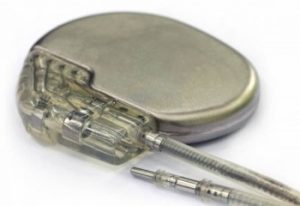 Engineers selected the pacemaker as one of the greatest contributions to society of the previous 50 years. In 1998 Greatbatch was inducted into the National Inventors’ Hall of Fame in Akron, Ohio, alongside his hero Thomas Edison. This was followed, in 2001, by the granting of the highest honor from the National Academy of Engineering, shared with his peer Earl Bakken, who invented the external pacemaker. Greatbatch’s autobiographical account of his discovery, The Making of the Pacemaker: Celebrating a Lifesaving Invention, was published in 2000. Wilson Greatbatch died at the good old age of 92 on September 27, 2011. Greatbatch served as an elder at Clarence Presbyterian Church, where he also sang in the church choir and taught Sunday school.
Engineers selected the pacemaker as one of the greatest contributions to society of the previous 50 years. In 1998 Greatbatch was inducted into the National Inventors’ Hall of Fame in Akron, Ohio, alongside his hero Thomas Edison. This was followed, in 2001, by the granting of the highest honor from the National Academy of Engineering, shared with his peer Earl Bakken, who invented the external pacemaker. Greatbatch’s autobiographical account of his discovery, The Making of the Pacemaker: Celebrating a Lifesaving Invention, was published in 2000. Wilson Greatbatch died at the good old age of 92 on September 27, 2011. Greatbatch served as an elder at Clarence Presbyterian Church, where he also sang in the church choir and taught Sunday school.
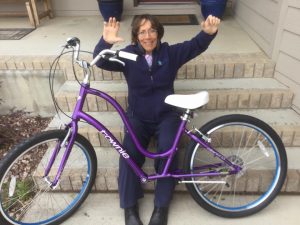 Shortly after my sister-in-law, Brenda Schulenberg lost a large amount of weight, she decided that she wanted to do something that she didn’t really get to do as a kid…ride a bicycle. Because her knees wouldn’t really allow her to work the pedals at that time, she looked into various kinds of bicycles. She considered the recumbent bicycle, but that didn’t work very well, because while she could sit in a chair-like position, the pedals still needed to be brought back toward her, meaning that her knees needed to bend quite a little bit.
Shortly after my sister-in-law, Brenda Schulenberg lost a large amount of weight, she decided that she wanted to do something that she didn’t really get to do as a kid…ride a bicycle. Because her knees wouldn’t really allow her to work the pedals at that time, she looked into various kinds of bicycles. She considered the recumbent bicycle, but that didn’t work very well, because while she could sit in a chair-like position, the pedals still needed to be brought back toward her, meaning that her knees needed to bend quite a little bit.
Finally, she settled on a strider. It was an idea she got from our nephew and niece, Eric and Ashley Parmely. When their kids were too little to pedal a bicycle, they got them a strider, which is a pedal-less bicycle. The child basically sits on the seat, but runs the bicycle along using their feet for power. The seat is low enough to allow 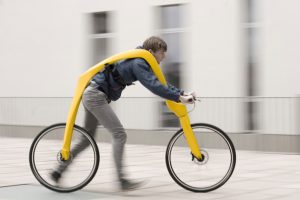 the child to have control, so they don’t fall over. It was a perfect idea for Brenda as well, because it let her be on a bicycle, but not have to pedal, which her knees would not allow at that time. These days, with her excess weight all gone, Brenda has put the pedals back on her bicycle and she can ride it normally.
the child to have control, so they don’t fall over. It was a perfect idea for Brenda as well, because it let her be on a bicycle, but not have to pedal, which her knees would not allow at that time. These days, with her excess weight all gone, Brenda has put the pedals back on her bicycle and she can ride it normally.
Someone else apparently thought the pedal-less bicycle was a good idea too, but in my opinion, their “bicycle” idea pretty much defeats the purpose. The invention is called the Foot Powered Bike, but to me it looks like the “rider” is carrying the bike around. The bike basically wraps around the “rider” and there is no seat at all. There are handlebars, but no pedals, seat, 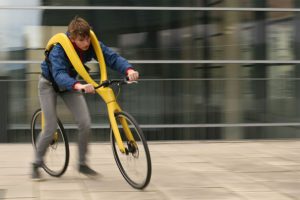 or bicycle chain. In the matter of the chain, I guess that you couldn’t get your clothes caught in something that isn’t there, but in looking at the way the “rider” must maneuver the bike, it seems to me that the contraption would be very easy to trip the “rider” up. In running along, the “riders” legs must straddle the back wheel. That is where the dangerous part comes in…in my mind anyway. Walking, or running, with a wheel between your legs is awkward, to say the least. I think most people would find their legs tangled up in that wheel, and any thought of “riding” this contraption would be lost, but the strangest part of this is calling it a bike at all. No seat, no pedals, and no chain…yep, I call that defeating the purpose.
or bicycle chain. In the matter of the chain, I guess that you couldn’t get your clothes caught in something that isn’t there, but in looking at the way the “rider” must maneuver the bike, it seems to me that the contraption would be very easy to trip the “rider” up. In running along, the “riders” legs must straddle the back wheel. That is where the dangerous part comes in…in my mind anyway. Walking, or running, with a wheel between your legs is awkward, to say the least. I think most people would find their legs tangled up in that wheel, and any thought of “riding” this contraption would be lost, but the strangest part of this is calling it a bike at all. No seat, no pedals, and no chain…yep, I call that defeating the purpose.
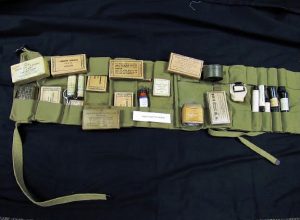 During World War II, if a man was a conscientious objector, things were…difficult. Things like that were not an automatic get out of the war card. Unless they had some necessary skill that would keep them stateside or in an office, they were signed up as a medic. Most of those men thought that was a good place for them, since the would be saving lives and not taking them, but I’m not sure who got it worse. The infantry or the medics.
During World War II, if a man was a conscientious objector, things were…difficult. Things like that were not an automatic get out of the war card. Unless they had some necessary skill that would keep them stateside or in an office, they were signed up as a medic. Most of those men thought that was a good place for them, since the would be saving lives and not taking them, but I’m not sure who got it worse. The infantry or the medics.
The men of the infantry usually considered the conscientious objectors to be cowards. That is not really the way a guy wanted to go into the army, but if they were seriously conscientious objectors, it was a calling they took seriously. 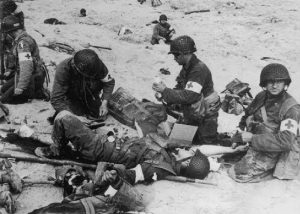 It was not, however, an easy job or the easy way out of combat. The difference between the infantrymen and the medics was that during combat, the infantrymen did their best to stay down, so the weren’t hit. The medics, on the other hand, ran into the fire to treat the wounded, and bring in the dead. It was no easy job.
It was not, however, an easy job or the easy way out of combat. The difference between the infantrymen and the medics was that during combat, the infantrymen did their best to stay down, so the weren’t hit. The medics, on the other hand, ran into the fire to treat the wounded, and bring in the dead. It was no easy job.
The medics, like most soldiers coming into the army were young men…boys really. They were often 18 or 19 years old. The infantrymen had plenty of names for them. None of them were nice…or complimentary, but the medics that stayed medics…the ones who ran into the fire to care for a wounded soldier were given new names. They were finally called medic…or more often Doc. And they were respected. They were also called hero, brave, courageous, and other respectful names. The 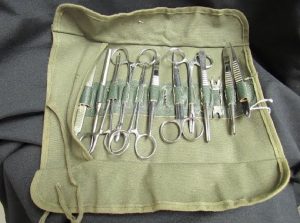 medics were not given the $10.00 per month extra that combat soldiers were given. That made the infantrymen furious. They collected money from each other to provide combat pay for their medics. The men refused to have their medics receive less.
medics were not given the $10.00 per month extra that combat soldiers were given. That made the infantrymen furious. They collected money from each other to provide combat pay for their medics. The men refused to have their medics receive less.
World War II saw eleven medics who received the Medal of Honor…as well as other medals. These men were wounded taking care of the men, and they were even killed saving the lives of the men in their care. These men were heroes, just like their counterparts in the infantry, and there isn’t an infantryman that ever fought, who would disagree.
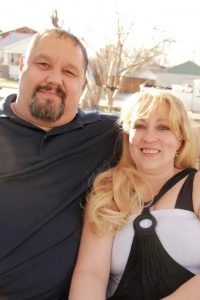
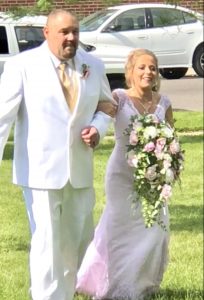 My nephew, Dave Balcerzak is a gifted computer programmer, and has helped many people with their computer issues, including me. I think the most awesome thing he has done is to rebuild old computers so that he can give them people who have a need for a computer, but cannot afford one. It is a noble thing to do, and very typical of Dave. He is a kind-hearted man, who wants to be able to help people in anyway that he can, and thankfully he has talents that allow him to be able to help a lot of people.
My nephew, Dave Balcerzak is a gifted computer programmer, and has helped many people with their computer issues, including me. I think the most awesome thing he has done is to rebuild old computers so that he can give them people who have a need for a computer, but cannot afford one. It is a noble thing to do, and very typical of Dave. He is a kind-hearted man, who wants to be able to help people in anyway that he can, and thankfully he has talents that allow him to be able to help a lot of people.
My niece, Chantel Balcerzak first met her now husband, Dave when they were kids in elementary school. She liked him immediately, and really never forgot him completely. Nevertheless, they both went their separate ways, and each married other people. After a number of years, families for both, and failed marriages, they met again, and it was like they were never apart. They were both free to marry now, so they did, and they created a blended family. Dave brought his two children, Keifer and Katy to the marriage, and Chantel brought her two living children, Jake and Siara to the marriage. Chantel also brought the memory of her angel baby, Alyssa, who Dave had never met, but because she belonged to Chantel, he loved her as much as any of the children…because that is the kind of man Dave is. Dave and Chantel have been blessed with three grandchildren, Izabella and Jaxx Harman, and Reece Balcerzak. They also have a bonus granddaughter, Alice Green, with whom Dave shares a birthday. And they have a grandson on the way. When I say that Dave has been blessed, I say that because I believe that Dave’s kindness and loving ways, have given him the reward of so many blessings.
Dave has been given one more blessing, and it is one that is of the type that is near to my heart…his heart. Dave developed so heart issues, that at one point caused him to have a stroke, which was caught by a CNA, while he was in the hospital. Her quick action left Dave with no lasting damage from the stroke. His heart, however, still needed some work. As the wedding of their daughter, Siara was coming and Dave was to walk 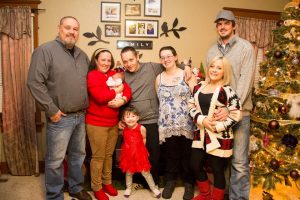
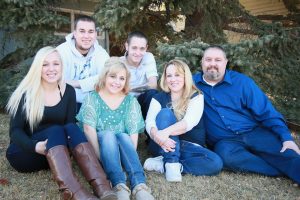 her down the aisle, he worried that he would not be able to do so, but God had another plan. An interesting procedure fixed his heart, and the man who had been only able to take a few steps without being out of breath, was able to walk Siara down the aisle. He is still healthy and very blessed indeed. Today is Dave’s birthday. Happy birthday Dave!! Have a great day!! We love you!!
her down the aisle, he worried that he would not be able to do so, but God had another plan. An interesting procedure fixed his heart, and the man who had been only able to take a few steps without being out of breath, was able to walk Siara down the aisle. He is still healthy and very blessed indeed. Today is Dave’s birthday. Happy birthday Dave!! Have a great day!! We love you!!

